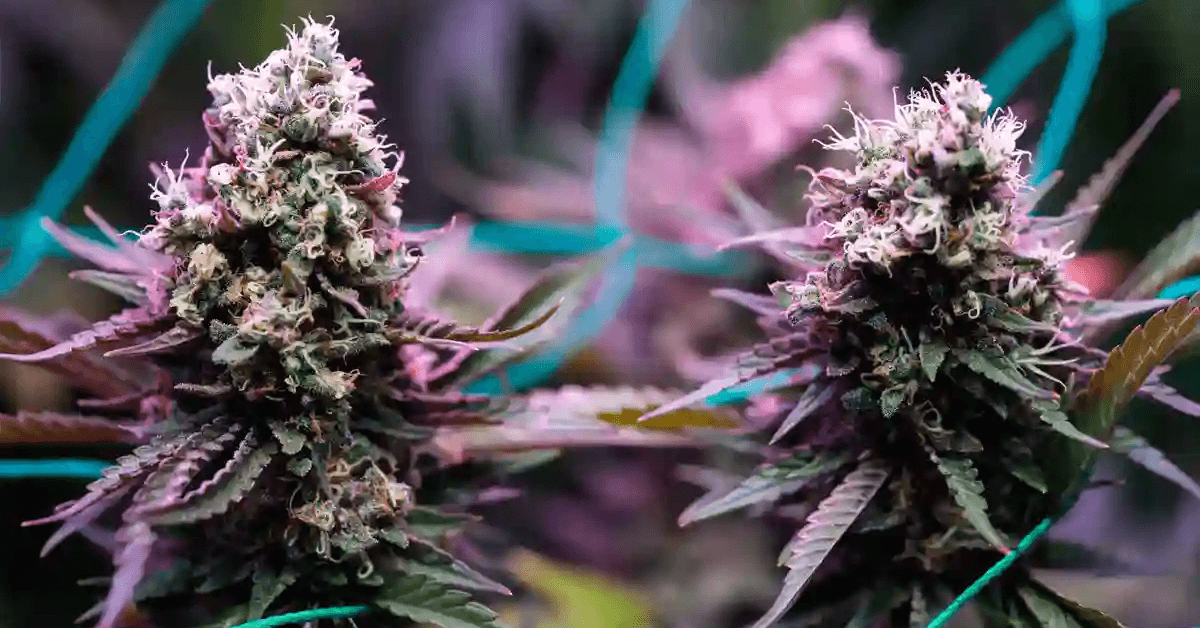House of Kush Expands to Michigan with Pleasantrees Collaboration

House of Kush, a cannabis genetics brand with a history in sports and science, has announced a partnership with Pleasantrees, a vertically integrated cannabis cultivator based in Michigan. This collaboration aims to introduce House of Kush's genetics to the Michigan market.
House of Kush has established its presence in Missouri, Maryland, and Ohio by focusing on preserving legacy strains and maintaining high standards in cannabis genetics. The brand's connections to the sports world and efforts to change the cannabis narrative have garnered attention among cannabis enthusiasts.
"We are excited to partner with Pleasantrees, a company that shares our commitment to quality," said Reggie Harris, CEO of House of Kush, in a statement to Benzinga. "Michigan has a growing cannabis community, and we look forward to introducing our genetics and products to this market. Pleasantrees' focus on cultivating premium cannabis aligns with our goals."
Focus on Social Justice
Harris pointed to Pleasantrees' involvement with Rick Wershe Jr., known as White Boy Rick, who was released from prison in July 2020 after serving 33 years. This connection underscores Pleasantrees' commitment to social justice, education, and community involvement, aligning with House of Kush's approach to the industry. "We need strong partners and recognition in the industry, and Pleasantrees adds credibility to our efforts," Harris noted.
Harris also highlighted Michigan as a significant cannabis market, emphasizing the importance of competing in such a prominent market.
Mutual Expectations for Innovation
Bryan Wickersham, President of Pleasantrees, expressed anticipation about the partnership, noting the potential for Michigan consumers to experience the genetics curated by House of Kush. "The product innovation from the HOK team will be noteworthy," Wickersham stated.
Michigan Cannabis Retailer Fights Los Angeles' Social Equity Licensing in Court

A Michigan cannabis retailer is contesting Los Angeles' social equity licensing program, asserting that it unfairly favors California residents. Variscite Inc. and its owner, Kenneth Gay, argue that the program violates the Constitution's dormant commerce clause by discriminating against out-of-state applicants.
In a response brief filed recently, Variscite contends that the city's motion to dismiss the case is based on erroneous arguments. The brief critiques the city's attempt to distinguish a First Circuit decision, which applies the dormant commerce clause to cannabis markets, and questions the relevance of a repealed 2013 memorandum from then-Deputy Attorney General James M. Cole of the U.S. Department of Justice.
Variscite's brief highlights that the First Circuit correctly recognized that Congress, through the Rohrabacher-Farr Amendment, has significantly decriminalized medical cannabis by prohibiting federal prosecution of state-legal cannabis operations. The company argues that this decision does not misconstrue federal law but rather affirms that the dormant commerce clause applies regardless of the federal legality of the interstate market.
The First Circuit's opinion, according to Variscite, only addressed medical cannabis because Maine conceded it was unlikely to succeed in defending its residency requirements for recreational use licenses. Variscite maintains that Congress did not exclude cannabis markets from the dormant commerce clause through the Controlled Substances Act (CSA). While the CSA allows Congress to criminalize the interstate cannabis market, the dormant commerce clause restricts states from favoring their residents over those from other states.
Variscite further argues that Congress, by passing the Rohrabacher-Farr Amendment and provisions allowing the rescheduling or removal of cannabis from Schedule I, has implicitly supported an interstate cannabis market free from federal intervention. Therefore, the dormant commerce clause should apply, regardless of cannabis's federal legal status.
The lawsuit claims that Los Angeles' social equity criteria, which prioritize applicants from specific Southern California areas or those with California cannabis convictions, unconstitutionally favor state residents. Jeffrey Mark Jensen, Gay's attorney, has contested similar residency requirements nationwide.
In May, Los Angeles renewed its motion to dismiss the case after the Ninth Circuit allowed one of Gay's businesses to challenge Sacramento's residency requirements. The Ninth Circuit found that abstention was not warranted since the ordinance clearly mandated residency for equity program participation.
The Central District of California paused Variscite's case during the Sacramento litigation.
Variscite's recent brief asserts that residency requirements do not advance the CSA's goals, as they do not prevent cannabis sales but rather ensure state residents benefit financially. The brief also criticizes the state's justification for excluding out-of-state owners, noting that Los Angeles permits up to 49% out-of-state ownership of licenses and allows nonresidents with a California cannabis conviction and residency in a disproportionately impacted area to fully own a license.
Moreover, Variscite disputes the city's reliance on the 2013 Cole memorandum, which advised against cannabis diversion enforcement. The memorandum, repealed in 2018, does not pertain to Variscite's lawsuit, which focuses on interstate commerce rather than cross-state cannabis movement.
Lastly, Variscite urges the court not to dismiss its damages claims, emphasizing that it seeks compensation for constitutional violations, not lost cannabis sales profits. Variscite argues that the city's lottery, held while the case was pending, constitutes a redressable constitutional breach.
Financial Collapse of Cannabash: Over $100K in Unpaid Dues Reported

Cannabash, a once-promising concert series in Michigan, has recently descended into turmoil, leaving a trail of unpaid debts and disappointed stakeholders in its wake. The event, organized by Grams & Jams and managed by CMS Consulting LLC, has issued over a dozen bad checks, ranging from $500 to $50,000. These checks have resulted in more than $100,000 in unpaid dues to artists, stage crew, and various vendors. The total amount owed, including unpaid staff, security, marketing costs, talent buyers, and sponsorship refunds, continues to grow as more claims are reported.
Personal Accounts and Financial Woes
Former staff members have come forward to share their experiences of financial betrayal. One former employee recounted how Daniel & Connie Sparrow (the organization's leadership) had jokingly mentioned the possibility of going bankrupt after the event as early as April, but assured everyone that the show would go on. Many staff members, some of whom had known the organizers for over two decades, initially saw no reason for concern. However, within a month and a half, paychecks stopped arriving. By the time the event occurred, some staff members found their final paychecks being withheld. One individual disclosed that they were owed just under $5,000, while acknowledging that others were owed even larger amounts.
Attempts to contact Grams & Jams or CMS Consulting LLC for comments have been unsuccessful. In a text message to former employees, the organizer suggested removing negative posts on social media in exchange for payment. An email to talent buyers revealed the organizer's frustration, stating, "I was willing to discuss payouts, but after the abusive, threatening, and traumatic behavior, I'm not vested in ensuring anything." No concrete evidence of the alleged threats or abusive behavior has been presented at this time.
In another email to a vendor, the organizer stated, "After consulting with my corporate counsel, there is nothing more required at this time. I will send you the dissolution certificate when I receive it tomorrow. There is no need to contact my attorney. The company is no longer operational."
Legal and Financial Ramifications
While some vendors have received a certificate of dissolution, the only evidence of a formal bankruptcy filing consists of emails and text messages from the owner of CMS Consulting to artists and former staff. One such message read, "I'm filing for bankruptcy and receivership. If you could please back off, I would appreciate it."
Victims are currently reporting their cases to the Muskegon County Sheriff's Department and the Department of Licensing and Regulatory Affairs (LARA). Additional reports are anticipated as more individuals come forward with their experiences and claims.
Community Reaction
The community's reaction to the Cannabash fallout has been one of disappointment, frustration, and anger. One vendor reflected on their financial losses over the years, noting that while the first year was profitable, subsequent years resulted in significant losses due to poor event management and placement. This year, the vendor decided against participating and, upon seeing the current situation, felt validated in their decision.
Another community member highlighted the potential for criminal charges, stating that writing bad checks in Michigan over $500 is a felony. They emphasized that if the allegations prove true, the bankruptcy court may offer little relief for those owed money.
The broader impact on the cannabis event management sector has also been a topic of discussion. Some community members expressed their hesitance to re-enter the formal cannabis industry due to similar negative experiences. There is a call for greater accountability and transparency to prevent such incidents in the future.

Cannabash 2024 Turnout
Broader Implications for the Industry
The Cannabash incident serves as a stark reminder of the importance of financial integrity and ethical management within the cannabis industry. As the community grapples with the fallout, it is clear that there is a need for stricter oversight and better practices to protect all stakeholders involved in cannabis-related events.
The scandal has also prompted a broader conversation about the overall state of the cannabis industry in Michigan. Many believe that the industry is plagued by unscrupulous actors who take advantage of the community's passion and commitment. There is a growing demand for more rigorous vetting processes and legal protections to ensure that such financial disasters do not recur.
Looking Forward
Moving forward, the Cannabash fallout highlights the critical need for event organizers to maintain transparent and honest financial practices. It also underscores the necessity for regulatory bodies to enforce stricter compliance measures to protect vendors, artists, and employees from financial harm.
The community's response suggests a collective desire to rebuild trust and establish a more secure and reliable industry framework. As legal proceedings unfold and more information comes to light, stakeholders hope that this incident will serve as a catalyst for positive change within the cannabis event management sector.
2 Chainz to Perform at Pure Options' Cannabis Community Event

Pure Options, a cannabis chain in Michigan, has announced that rapper 2 Chainz will headline its Back 2 School Block Party on September 7th. This event, celebrating cannabis, culture, and community, will take place in the parking lot of Pure Options' location at 203 N. Clippert St. in Lansing.
The Block Party promises a day filled with music, food, games, and various activities. Alongside 2 Chainz, local artists will perform live music, creating a vibrant atmosphere for attendees. Additionally, the Michigan State vs. Maryland college football game will be broadcasted on a big screen, catering to sports enthusiasts.
Cannabis enthusiasts will have the chance to explore a variety of products from different vendors, with exclusive deals and promotions available only at the event. On-site cannabis consumption will be permitted for those aged 21 and older, making it a unique experience for attendees.
To satisfy appetites, local food trucks will offer a range of culinary options, ensuring that everyone can find something to enjoy. Various games and activities will be available throughout the day to keep attendees entertained.
Past events hosted by Pure Options, such as the 420 Block Party in April, have drawn large crowds and featured performances by artists like Sean Kingston. The success of these events has inspired the Back 2 School Block Party, which aims to be the first in a series of festival-style events designed to foster community spirit.
General admission tickets are priced at $20 and will provide access to all event areas, including the vendor showcase, live performances, and food trucks. A limited number of VIP tickets are available for $200, offering extra perks such as access to private seating areas and a premium goody bag containing cannabis products from various vendors.

Ex-Skymint CEO's Ex-Wife Acquires Cannabis Operation Amid Ongoing Legal Battles

Susan Radway, the ex-wife of Jeff Radway, a prominent figure in Michigan's early legal cannabis industry, has made a significant entry into the state's cannabis market. According to court documents, Susan Radway has acquired cannabis plants and processing equipment from a former Skymint facility located at 1669 E. Jolly Road in Lansing.
This facility, initially established by Jeff Radway in 2018, faced substantial challenges after Skymint entered receivership last year amid accusations of financial mismanagement. Susan Radway's company, Fantasy Farms LLC, purchased the assets from the receivership for $350,000. The North Carolina-based company received prequalification approval from the state to operate the grow operation in January.
Jeff Donahue, Skymint's executive vice president and general counsel, confirmed that Fantasy Farms is now managing the grow operation and has retained approximately 75% of the former Skymint staff.
The acquisition marks a new chapter in the complex saga of Skymint, which led to Jeff Radway's departure and subsequent divorce from Susan Radway. Several attempts to contact Jeff and Susan Radway for comments were unsuccessful.
Jeff Radway was at the center of controversy surrounding Skymint, which was placed into receivership by an Ingham County Circuit Court judge in March of last year due to unpaid debts. Skymint, primarily operating under Green Peak Innovations Inc., owed over $127 million to Canadian investment firm Tropics LP, which alleged the company was losing $3 million monthly while generating only $110 million in revenue in 2022, far below the forecasted $263 million.
Additionally, a lawsuit filed by New York-based cannabis investment firm Merida Capital Holdings accused Skymint and its executives of financial misrepresentation and mismanagement. Merida also alleged that Jeff Radway used Skymint's funds for personal expenses and engaged in inappropriate relationships with employees, which included settlements using company funds to silence allegations.
Although an Oakland County judge dismissed a lawsuit by Merida that sought to prevent the sale of former 3Fifteen properties, Merida has appealed the decision.
Despite the turbulent history, Susan Radway and Fantasy Farms are moving forward with their cannabis operations. Jeff Radway, though not involved with Fantasy Farms, co-owns the building at 1669 E. Jolly Road with Susan. The property, initially acquired for $659,000, was sold to 1669 E. Jolly Road LLC for $100 in March. Both Jeff and Susan are owners of the LLC, according to court records, and Fantasy Farms is leasing the building.
Susan Radway's prior business experience includes running Moxifit Body Fuel LLC, a health supplement company dissolved in December. She had no known involvement in the cannabis industry during her marriage to Jeff Radway. Jeff Donahue of Skymint confirmed her lack of prior engagement with Skymint.
The future for Fantasy Farms could be challenging, given the high production costs at former Skymint facilities, which averaged over $1,000 per pound—significantly higher than the $450 per pound that is considered profitable. This cost issue contributed to Skymint's decision to cease all growing operations this year, including closing its 56,000-square-foot facility in Dimondale in March. The facility has since been leased to Lume Cannabis.
Currently, Skymint focuses solely on retail sales, operating 20 stores across Michigan. Despite the receivership, Skymint remains competitive, according to Donahue, who emphasized the company's stability and ongoing efforts to reduce costs.
Tropics LP, through Skymint Acquisition Co., acquired Green Peak Industries' assets, doing business as Skymint, for $109.4 million in a receivership auction. However, the deal is pending closure due to ongoing lawsuits that must be resolved before Tropics can take control.
Mason Voters to Decide on Recreational Cannabis Sales in November

The city of Mason may soon join other Lansing-area municipalities in allowing recreational cannabis sales, pending the outcome of a city ordinance proposal set for the November ballot.
Earlier this month, the Mason City Council decided to present the ordinance proposal to voters during the general election. This decision followed a letter from Ypsilanti attorney Anderson Grandstaff, who, representing an undisclosed group of clients, indicated intentions to initiate a petition drive to overturn Mason's ban on recreational cannabis sales. This ban has been in place since the statewide approval of the 2018 Michigan Regulation and Taxation of Marihuana Act.
Should the ballot proposal pass, it would contribute to the broader expansion of recreational cannabis dispensaries in the region. To date, such dispensaries have primarily operated in Lansing, East Lansing, and Meridian Township. Eaton County saw its first dispensary open in Charlotte this summer, with a second one planned for the city. In contrast, Clinton County currently hosts one grower near Lansing but lacks recreational dispensaries.
Mason Mayor Russ Whipple noted that Grandstaff's petition was never circulated and was the sole petition brought before the council.
Grandstaff, who has been instrumental in promoting cannabis sales in various Michigan communities, declined to comment on his involvement with Mason or to disclose his client's identity.
In 2018, Michigan voters approved the legalization of recreational cannabis by a 56% to 44% margin. However, the law permitted individual municipalities to opt out of allowing sales and related businesses. Mason chose to ban retail cannabis sales, a decision echoed by many other communities across the state.
Mason City Manager Deborah Stuart highlighted the distinction between legalizing recreational cannabis use and permitting retail establishments within a community. She pointed out that industry-driven ballot proposals often lack local initiative.
During their July 15th meeting, council members took into account the 2018 general election results in Mason, where 2,245 voters supported legalization and 1,612 opposed it. This led them to opt for placing their own ballot question on the November ballot, rather than one proposed by Grandstaff.
The city's proposed ordinance, if approved, would allow for two retail cannabis establishments. The application fee would be $5,000, with additional renewal fees applicable.
Stuart mentioned that the city would provide a draft ordinance and additional information on its website at least 60 days before the election for residents to review.
A previous petition to overturn the ban did not garner sufficient signatures to reach the ballot. However, Grandstaff's recent letter, threatening a new petition drive with a proposed ordinance, prompted the City Council to reconsider its stance.
Grandstaff's letter to the City Council suggested that his client believed there would be substantial grassroots support for the proposed ordinance, aiming to avoid an adversarial relationship with the council.
Permitting retail cannabis licenses could also secure state tax revenues for Mason. Michigan's recreational cannabis market, valued at $3 billion, generated $87 million in tax proceeds distributed to 269 municipalities in February. Each city, township, village, or county with a dispensary received approximately $59,000 per establishment, potentially netting Mason $118,000 with two dispensaries.
Ingham County received $1.8 million from its 30 stores, ranking behind Bay, Kalamazoo, Washtenaw, and Wayne counties in store numbers. Lansing had about 24 businesses at that time, surpassed only by Ann Arbor and Detroit, with 26 and 59 shops, respectively.
Origins of the Proposal
Grandstaff's 2023 letter included a draft ordinance limiting Mason to two retail cannabis establishments, excluding growers, processors, facilities, and transporters. According to a city staff memo to the City Council, this proposal would lift Mason's prohibition on recreational cannabis retail businesses, creating a regulatory framework for licensing and guidelines for city employees.
Mayor Whipple noted that the proposed adoption process was impractical and that establishing a municipal framework for cannabis businesses was uncomfortable for city officials. Grandstaff expressed a willingness to discuss ordinance adjustments to align better with the city's preferences.
Mason officials collaborated with Grandstaff and reviewed Birmingham's approach to cannabis regulation. Birmingham had similarly been approached by an external entity proposing cannabis establishments. Birmingham chose to draft its own ordinance for a ballot proposal, which ultimately failed by a significant margin in November 2023.
Grandstaff's Broader Efforts
Grandstaff has pursued cannabis legalization in various Michigan communities through petition drives. Among these were Harbor Springs, Howell, Kinderhook Township, and several Oakland County cities, including Auburn Hills, Clarkston, Keego Harbor, Lathrup Village, and Leonard Village. Some of these efforts led to proposals on ballots, with mixed outcomes; for example, Keego Harbor and Auburn Hills approved ordinances, while others did not.


 Helpful Links
Helpful Links